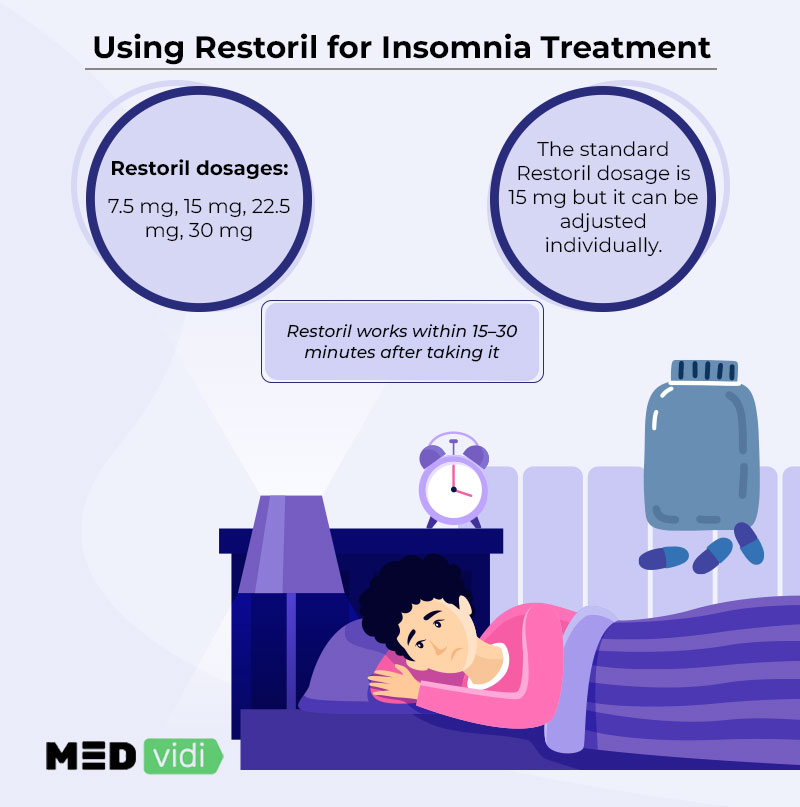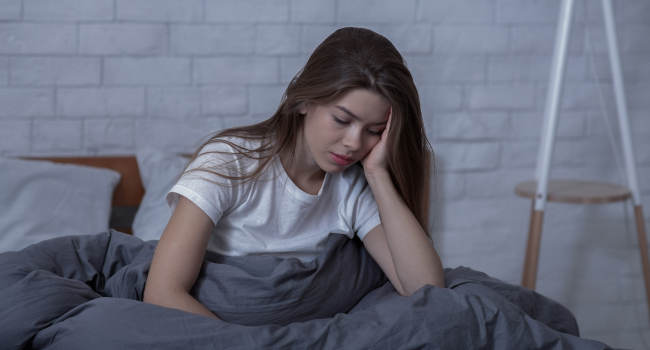Restoril is the brand name for temazepam. It’s a prescription medication for treating short-term insomnia, belonging to a class of drugs called benzodiazepines. This class consists of sedative-hypnotic or depressant medicines that slow down brain activity, making a person fall asleep.
In addition to sleep, Restoril can also help deal with anxiety because of its calming effect on the mind. However, in this article, we’ll focus on the use of Restoril for insomnia. Keep reading!
You deserve quality sleep, and we can help you improve it
Is Insomnia Wide-Spread?
Insomnia happens due to various causes and manifests itself differently depending on the individual. Some people find it hard to fall asleep. Some wake up in the middle of the night, while others wake up earlier than desired. Also, sleep may be of poor quality, and a person may feel tired in the morning.
Several studies conducted globally show the
How to Use Restoril for Insomnia
Restoril is a controlled substance under schedule IV because it comes with a risk of physical dependence. It can be misused or abused by people. So, only an accredited doctor can prescribe it.
Restoril comes in capsules of 7.5 mg, 15 mg, 22.5 mg, and 30 mg. The usual standard dosage for Restoril is 15 mg but it can be adjusted individually. It depends on the patient’s age, medical history, weight, and potential side effects. Since Restoril is meant to treat short-term insomnia, one is supposed to take it for up to 10 days only.
Notably, not everyone with a sleeping disorder should take Restoril for insomnia. Generally, people under 18 years, pregnant women, and those with temazepam allergy shouldn’t take it. It’s also not recommended for those with kidney, respiratory, and liver problems. A person who takes antidepressants and one who drinks excess alcohol should be cautious with the drug to avoid severe side effects.
Ask MEDvidi doctors about medication management for insomnia. We will choose the medicine that will help you best
How Fast Does It Work?
Restoril works within 15 to 30 minutes, so one should take it 15 to 30 minutes before bedtime. Once taken, the drug interacts with brain chemicals leading to a slowdown in the nervous system. As a result, a person becomes drowsy and falls asleep.
Restoril helps overcome insomnia in three ways:
- Falling asleep faster
- Reducing the number of times a person wakes up at night
- Staying asleep longer

Restoril Vs. Ambien
Ambien is also a controlled substance for treating short-term insomnia. It has the same benefits as Restoril for insomnia, but there are also differences between the two.
Restoril | Ambien | |
|---|---|---|
Drug class | Benzodiazepine sedative-hypnotic | Non-benzodiazepine sedative-hypnotic |
Dosage | Capsules of 7.5 mg, 15 mg, 22.5 mg, and 30 mg | Immediate-release pills of 5 mg and 10 mg and extended-release tablets of 6.25 mg and 12.5 mg |
Half-life | 9 to 10 hours | 2.5 to 3 hours |
Onset of action | Works within 15 to 30 minutes | Starts working within 30 minutes and reaches its peak between 1 to 2.5 hours |
Type of insomnia treated | Short-term insomnia that results from disruption of sleep schedule or particular stressors | Short-term insomnia that results from trouble initiating sleep and difficulties in maintaining sleep |
Both medications share many side effects, such as headache, fatigue, and hangover. However, Compared to Restoril, Ambien is more likely to cause abnormal dreams, constipation, and allergic reaction, and sometimes it may cause severe adverse effects like amnesia and sleepwalking. On the other hand, Restoril is more likely to cause depression and weakness than Ambien.
Restoril Side Effects
Restoril can cause other side effects, such as:
- Muscle weakness
- Indigestion and nausea
- Amnesia
- Blurred vision
- Loss of balance and coordination
- Nervousness and dizziness
- Headache
- Fatigue
Severe side effects of Restoril can include depression, hallucination, and confusion. It can also worsen suicidal thoughts in patients with depression.
Continuous use of Restoril can lead to dependency, followed by addiction. As a result, it’s difficult to withdraw from the drug, so patients should involve their doctors when withdrawing it. Usually, the doctor prescribes a lower dosage which helps reduce the withdrawal symptoms.
Summary
Restoril, whose generic name is temazepam, treats short-term insomnia resulting from disruption of sleeping schedule and particular stressors. That means one can’t take it for more than ten days. After taking the drug, it’s critical for the person to have 7 to 8 hours of sleeping time.
One should not take the drug without a doctor’s prescription because it can lead to addiction and severe side effects. Also, one should inform the doctor of other drugs they’re taking to prevent drug interaction. A consultation is also required if side effects occur so as to choose an alternative medication.
At MEDvidi, you can get full support when taking medications for insomnia, from choosing the most suitable drug to getting help in the withdrawal process. Contact us today to start insomnia treatment.













